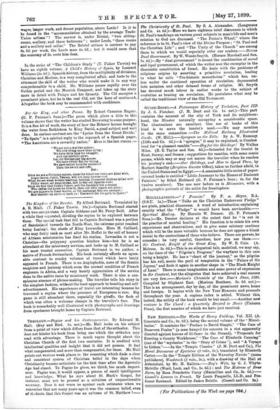THEOLOGY.—Papias and his Conteniporaries. By Edward II. Hall. (Gay and
Bird. 6s. net.)—Mr. Hall looks on his subject from a point of view which differs from that of the orthodox. This does not hinder his book from being one which the orthodox may read with advantage. There is much vague thought about the Christian Church of the first two centuries. It is credited with intellectual qualities and insight that it did not possess. It had what compensated, and more than compensated, for these. Mr. Hall points out various weak places in the reasoning which finds a clear and consistent system of Christian belief in the days when Christianity became articulate for the first time after the Apostolic Age had closed. To Papias he gives, we think, too much import- ance. Papias was, it would appear, a person of small intelligence and knowledge. What he says about St. Mark's Gospel, for instance, must not be pressed as a criticism of unquestionable accuracy. Does it not warn us against such estimates when we remember that not many years ago it was the common belief, even of students, that this Gospel was an epitome of St. Matthew '- The Christianity of St. Paul. By S. A. Alexander. (Longmans and Co. 4s. 6d.)—Here we have eighteen brief discourses in which St. Paul's teachings on various great subjects in man's life and man's relation to God are discussed. "The Potter's Wheel," where the reference is to St. Paul's view of the Divine Purpose ; "St. Paul and the Christian Life" ; and "The Unity of the Church" are among those to which we would especially refer our readers.—Divine Dual Government: By W. Woods Smyth. (Horace Marshall and Son. 75. 6d.)—By "dual government" is meant the combination of moral and legal government, of which the writer sees the exemplar in the theocratic constitution of Israel. He deals with the problems of religious origins by asserting a primitive revelation, leading to what he calls "Pre-historic monotheism" which has, un- less under the continued operation of revelation, degenerated into animism and other debased forms of religion. Mr. Smyth has devoted much labour in earlier works to the subject of evolution as bearing on revelation. He postulates what may be called the traditional view of the Old Testament.






































 Previous page
Previous page